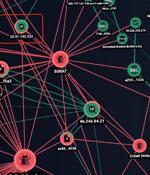Security News

Keeping up with financial fraud is incredibly difficult because accurate fraud detection requires a deep, real-time analysis of all the events surrounding a transaction. Teams need to have a portfolio of techniques to call upon, a centralized structure for identifying and combatting threats, and an agile approach to fight cyber-attacks and financial fraud.

The North Korea-linked Lazarus Group has been observed weaponizing flaws in an undisclosed software to breach a financial business entity in South Korea twice within a span of a year. While the first attack in May 2022 entailed the use of a vulnerable version of a certificate software that's widely used by public institutions and universities, the re-infiltration in October 2022 involved the exploitation of a zero-day in the same program.

The participants were asked about attacks targeting the financial and accounting data of their organizations. Looking ahead, almost half of the executives polled expect both the volume and size of cyberattacks targeting this type of data to increase in the coming year.

A new Android banking trojan has set its eyes on Brazilian financial institutions to commit fraud by leveraging the PIX payments platform. "PixPirate belongs to the newest generation of Android banking trojan, as it can perform ATS, enabling attackers to automate the insertion of a malicious money transfer over the Instant Payment platform Pix, adopted by multiple Brazilian banks," researchers Francesco Iubatti and Alessandro Strino said.

A cybercrime group dubbed Bluebottle has been linked to a set of targeted attacks against the financial sector in Francophone countries located in Africa from at least July 2022 to September 2022. "The group makes extensive use of living-off-the-land, dual use tools, and commodity malware, with no custom malware deployed in this campaign," Symantec, a division of Broadcom Software, said in a report shared with The Hacker News.

Financial institutions are being targeted by a new version of Android malware called SpyNote at least since October 2022. "This has helped other actors [in] developing and distributing the spyware, often also targeting banking institutions."

Financial and insurance sectors in Europe have been targeted by the Raspberry Robin worm, as the malware continues to evolve its post-exploitation capabilities while remaining under the radar. "What is unique about the malware is that it is heavily obfuscated and highly complex to statically disassemble," Security Joes said in a new report published Monday.

Travel agencies have emerged as the target of a hack-for-hire group dubbed Evilnum as part of a broader campaign aimed at legal and financial investment institutions in the Middle East and Europe. The attacks targeting law firms throughout 2020 and 2021 involved a revamped variant of a malware called Janicab that leverages a number of public services like YouTube as dead drop resolvers, Kaspersky said in a technical report published this week.

Compared to other industries surveyed, financial institutions are much more concerned about users who have legitimate access to their cloud infrastructure. 44 percent of respondents in this sector say their own IT staff poses the biggest risk to data security in the cloud and 47 percent worry about contractors and partners, compared to 30 percent and 36 percent respectively in other verticals surveyed.

A French-speaking threat actor dubbed OPERA1ER has been linked to a series of more than 30 successful cyber attacks aimed at banks, financial services, and telecom companies across Africa, Asia, and Latin America between 2018 and 2022. According to Singapore-headquartered cybersecurity company Group-IB, the attacks have led to thefts totaling $11 million, with actual damages estimated to be as high as $30 million.